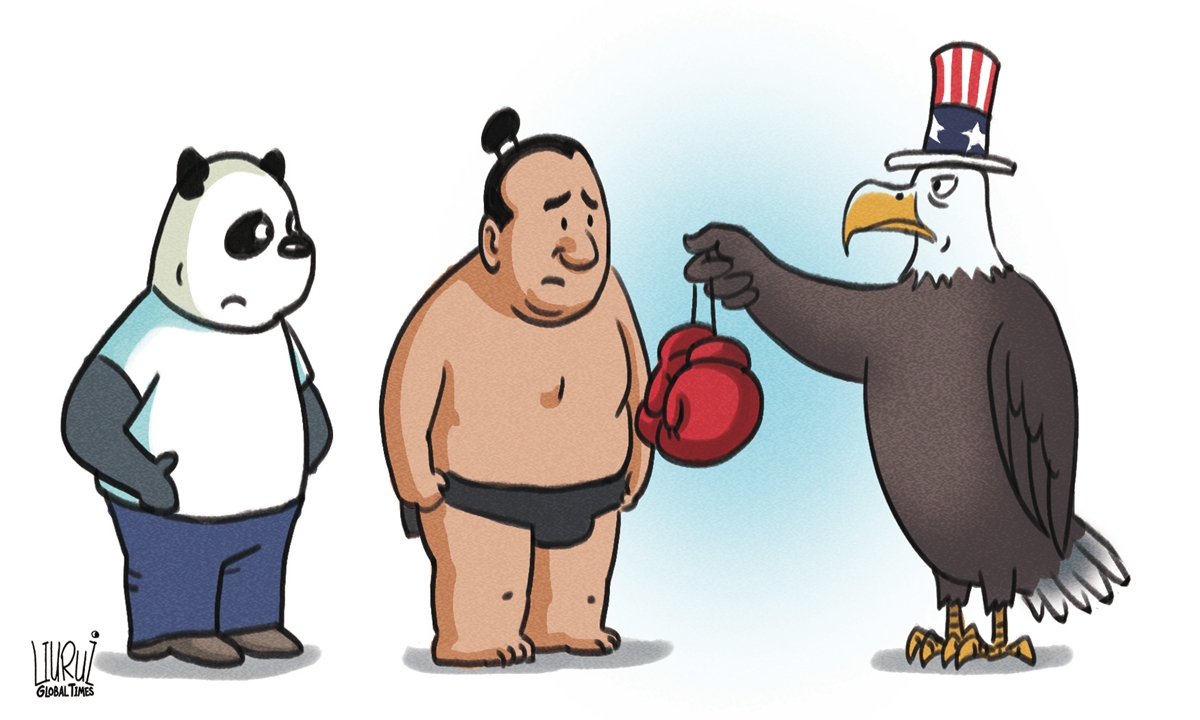Washington’s Diaoyu Islands promise tricks Tokyo to bash Beijing
Source: Global Times Published: 2020/8/2 14:56:14

Illustration: Liu Rui/GT
The US has been adopting a fuzzy strategy in regard to Japan's claim over the Diaoyu Islands. It is therefore not surprising that General Kevin Schneider, the commander of US Forces Japan, said it would help Japan monitor Chinese ships around the waters.
Even though the US has extended the US-Japan security treaty to cover Diaoyu Island, Washington hasn't promised to help Tokyo defend the waters with its own troops. Schneider's remark that the US "is 100 percent absolutely steadfast in its commitment to help the government of Japan with the situation" is more like lip service used to cozy up to the Japanese government.
The China hawks of the US, including Secretary of State Mike Pompeo, are trying to form a global anti-China camp, which needs solid allies. Countries like Japan, Vietnam, and Australia are of the first batch the US aims to rope in. Hence, Washington will show firm support to these countries in regard of their disputes with China. Schneider's remarks are in line with the US' attempt to rope in Japan.
Washington knows how hard it is to have military conflicts in the waters around the Diaoyu Islands. But to draw Tokyo to its side, Washington needs to give a verbal promise: It could probably help Japan defend the islands. Nonetheless, it is very uncertain whether the US will actually send troops to the Diaoyu Islands if there are any conflicts between China and Japan in the waters - as it depends deeply on whether or not the deployment meets the US' national interests.
By taking Japan's side on the Diaoyu Islands issue, the US wants Japan to help it maintain its global hegemony and military presence in the Asia-Pacific region. This will maximize the US interests. However, defending Japan is not the US' top interest, so Washington will think twice before it really sends troops to a war zone - should any emerge.
The Diaoyu Islands are Chinese territory. With diplomacy, Beijing has been calling on all parties to uphold stability in the region. This is in line with these parties' interests. Tokyo is willing to put aside disagreements about the Diaoyu Islands and meet Beijing half way. But Washington is not likely to give up making use of the islands and it will try every means to sow discord.
Japan has its own considerations. It wishes to keep a balance between China and the US. Keeping a benign relationship with China is in line with Japan's actual interests and its demands of national security. But the US is reluctant to see a peaceful world. It wants chaos, especially in the South China Sea, the East China Sea, and other regions surrounding China. Therefore the US is fond of inciting antagonism between China and any neighboring country. Just take what happened recently between China and India as a clear case.
The US thus aims at using wolf pack tactics to contain China. Whether there will be a sudden military conflict between China and the US depends on whether or not the US can marshal an anti-China alliance to its will. If Washington cannot form such an alliance, it is actually not capable or brave enough to engage in military operations against Beijing.
In fact, the US has been the evil backstage manipulator of China-Japan disputes over the Diaoyu Islands. The Trump administration won't stop playing the China card to win more support for votes with the presidential elections at the corner. Therefore, the White House will take unusually tough measures against China leading up to the election on November 3.
Such being the case, what should China do? The Asian giant should maintain its strategic focus and keep a sober head. No matter who is elected as the US president in November, the US' pressure campaign against China won't let up. China should keep strengthening its own capabilities in order to safeguard the country's interests of sovereign, security and development.
The article was compiled by Global Times reporter Lu Yuanzhi based on an interview with Song Zhongping, a military expert and TV commentator. luyuanzhi@globaltimes.com.cn
Posted in: ASIAN REVIEW